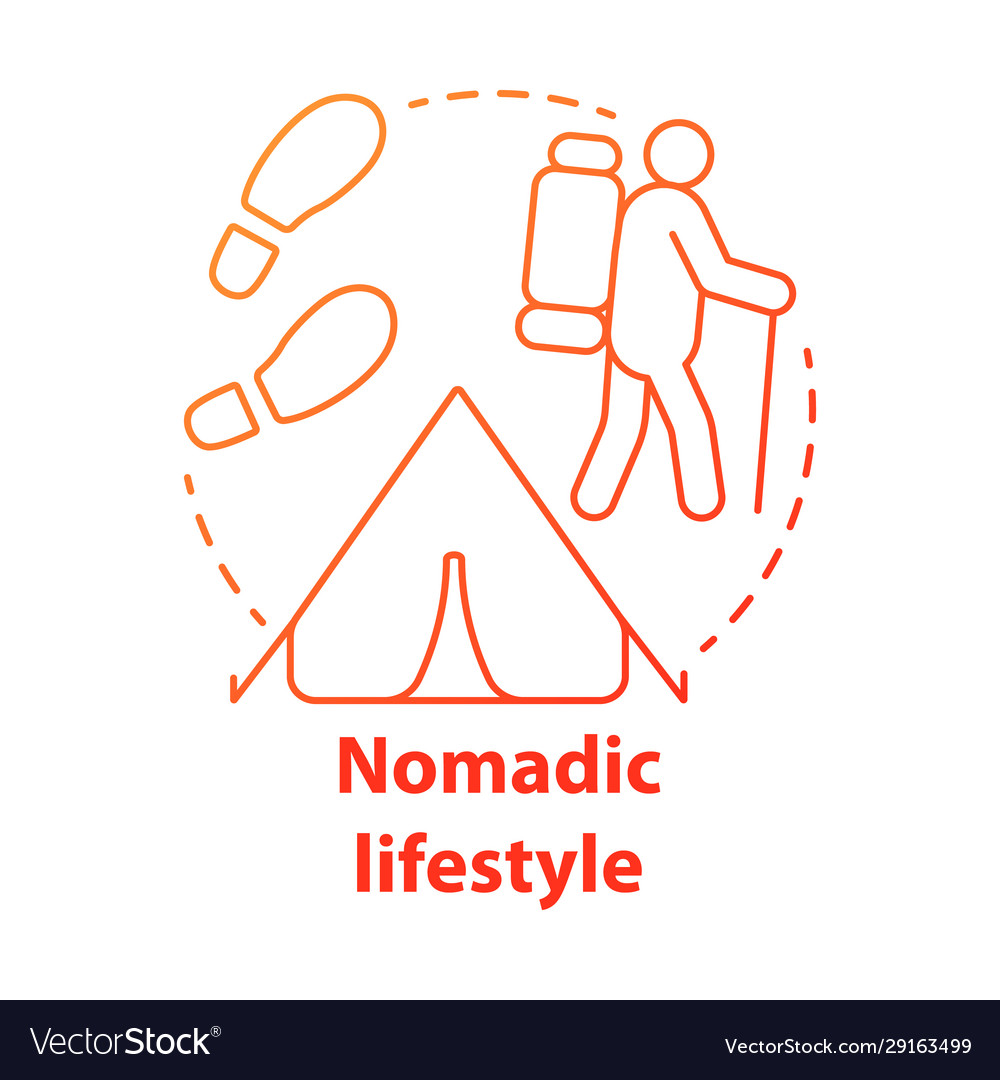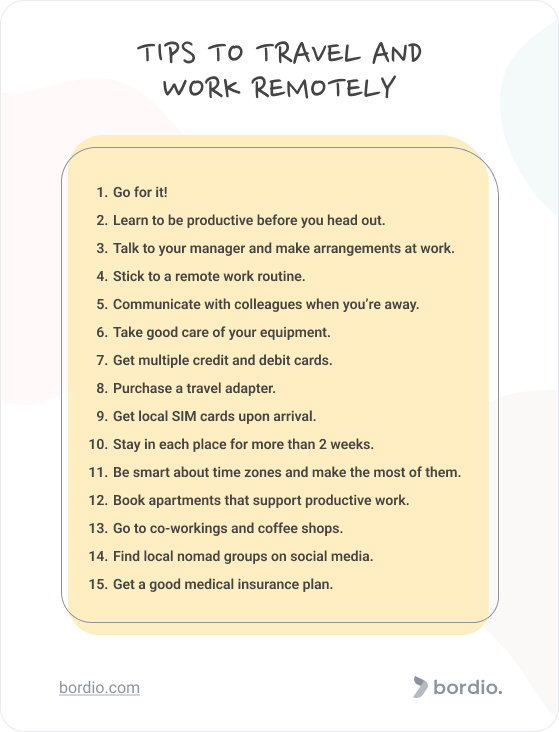
Whether you want to move abroad for a job, learn a new language, or just live an adventurous lifestyle, there are many countries that will allow you to do so. A nomad visa will allow you to stay in the country for up to 12 months. In some cases, you may be able to extend your stay. You must meet all requirements for the country where you are applying.
A visa for digital nomads is granted to individuals who are able to work remotely. The concept is not novel, but some governments have adopted it to increase foreign visitors. To attract highly qualified professionals, many countries have created digital nomad Visas. Travel has made it easier for people to work from their homes. Many companies now make remote work a regular part of their workforce.

A nomad visa can have many advantages as well as disadvantages. While some nomads may not be eligible for visas, others will need to sacrifice their lifestyle to qualify. You will be required to meet the minimum requirements. They will differ from country to country. If you have questions, please contact your local embassy. These visas are easy to obtain and you can stay in the country for one or two years, depending on which country you're from.
You can get a digital nomad visa for Europe if you plan to travel in Portugal, Spain and Germany. Malta also offers a digital nomadic visa, which allows you to live and/or work in Malta up to a year. It's not for everyone, but it's an amazing opportunity for those who desire to live on a small island that has more than 300 sunny hours per year.
If you're not interested in living in Europe, you can also look into a digital nomad visa in Mexico, Argentina, Brazil, and Uruguay. You can work remotely in these countries for one year but there are stricter requirements. You will be required to provide proof of insurance and a clean criminal history.
There are also digital nomad visas which allow you to work remotely up to 12 months in South America or the Caribbean. While you may need to pay tax, it is possible to be exempted from tax if your business is self-employed. Tax requirements differ by country so make sure to check the details.

There are countries that offer no visa but allow remote work for a year. Spain, for instance, has been working on a digital nomad visa since a while, but they are still not sure of the details. It is expected that legislation will be passed before the end of the year.
FAQ
How do digital nomads get paid?
Upwork and Freelancer both offer great opportunities for remote jobs. They also make it simple for freelancers find clients.
They help you to create a portfolio and showcase your skills. They offer feedback on your performance, and help you track the projects that you have completed.
A variety of apps and tools online can help manage your time, communicate to potential employers, or automate tasks.
There are also dangers. When searching for work, you might encounter fake profiles or scams. Freelance platforms can charge fees but provide no value to the client.
Your past clients could leave negative reviews. You might even fall prey to identity fraud.
These problems can be avoided by carefully reviewing the site before signing up. Be sure to check for reviews and testimonials. If an employer hasn't vetted someone, steer clear.
Scammers can be tricky to spot, especially if you work remotely.
As long as you're careful, you won't encounter any major issues.
What are two disadvantages of being a nomad?
Spending a lot of time without family or friends can lead to inability make long-term plans.
There are many negative aspects to traveling for work. But, living life on-the-road has its benefits.
You meet people you'd never otherwise meet and get to know about new cultures and places. There are many opportunities to explore new cities and countries.
You have to learn how to discipline yourself to leave behind family and home so you can spend more time with them. So how do you balance these two very different worlds?
There are ways to minimize your impact as a nomad. You might choose to live cheaply and work abroad. Or you might decide to rent out a room in your house so that you can spend more time with loved ones back home.
Planning is another way to lessen the impact of your family leaving. Before you go, set up a schedule of where you'll be going and when you'll be returning. You should have a backup plan in place for any unexpected events.
Let yourself relax when you return home. It's okay to take a few days off from a tiring day at work.
Do not make major decisions, such as moving overseas permanently for one year. Instead, focus on smaller changes that you can make now.
Make small adjustments to your lifestyle; eat healthier meals, exercise more often, and sleep better. You can make small changes that will have big impact.
You can also take time off work to recharge your batteries, and then get ready to go on another adventure.
Where do digital nomads typically stay?
Popular destinations for digital nomads include the Caribbean and Southeast Asia. But you don't have to leave your house to live for several months.
A digital nomad's best choice is where they feel most content. This could be anywhere warm and tropical, as well as any other place on Earth where they can find inspiration.
However, digital nomads often find these places attractive because of the climate. They tend to stay longer if they can afford rent.
Digital nomads travel light but spend more time outdoors than anyone else. It's crucial that they find a place that offers plenty of outdoor activities when choosing a destination.
These include surfing, kayaking and skiing.
They love cities too and would happily move to any city that provides access to nature.
For those living out of a suitcase, the key is finding a location where they can easily connect to wifi. This is why you should avoid areas that have poor signal.
It is a great idea to search for a hostel to avoid these difficulties. These places offer accommodation and internet access.
Hostels are perfect for digital nomads who prefer to pack light and keep costs low. They are also very social environments, so meeting new people is easy.
Many hostels have common kitchens and areas for guests to get together. There are also laundry facilities, bike rental, tours, and many other opportunities to explore the area.
How to stay safe while living digitally as a nomad?
Online is where you can meet your most friends and associates, so you won't stop living in the real world. But as a digital nomad, you won't necessarily live out of an office, either. So how do you balance staying safe when traveling?
First, make sure your computer is virus-free. This means making sure you have the latest Windows updates installed and that they are regularly updated.
It is also important to make sure your software is the most recent version. If it isn't, update it immediately. If cloud services like Dropbox, iCloud or Box aren't working correctly, you could be locked out your files.
VPN (virtual personal network) services protect your internet connection from outsiders. Check with your ISP to see if you are eligible.
VPNs protect your privacy by encrypting your web traffic. This makes it more difficult for hackers and other malicious actors to intercept your personal information. A VPN app can be downloaded onto your smartphone to connect to public WiFi networks.
Finally, ensure that your phone is charged. Accessing your contact information can save you hours of time searching for lost passports or wallets.
Where do digital nomads eat most often?
A digital nomad can be defined as someone who travels without permanent ties for business or pleasure. This term was first used by Tim Ferriss (American author), in 1999 after Ferriss moved to Thailand. He was an "anti-corporate crusader."
Digital nomads now exist more than ever. Nomadic Matt estimates that there are approximately 11 million digital nomads currently active worldwide.
A person traveling on average spends between $1,000-$2,500 per monthly. This is why most digital nomads avoid expensive places like New York City and Los Angeles. They travel where cheap food is available.
Digital nomads can be found eating anywhere from cafes to restaurants to hostels. According to Nomadic Matt they are most comfortable in coffee shops, where they spend a lot time talking and sitting.
The key to finding these places is to ask locals. Look online for reviews, photos, and videos if you don’t understand the language. Ask fellow travelers how much they paid for their meals. You can then choose a similar restaurant to yours. Take for example: If you are paying $10 for lunch in Paris then find something that is similar in Rome.
TripAdvisor or Yelp are two other great ways to find these locations. Google Maps can be used to search for specific places.
What's a day like for a digital nomad looking to travel?
A digital nomad may have a different day depending on their location. It could include the following:
-
Logging in and creating new accounts
-
Content creation (articles, blogs)
-
Researching new markets
-
Meeting new contacts
-
New opportunities
-
Negotiating contracts
-
Working on projects
To become a digital nomad, you must learn how to juggle all these different aspects of life.
This means you need to create a schedule that will allow you to complete everything while still enjoying your life.
Maybe you have a morning routine where you check email, schedule meetings, and answer emails. You then take some time to relax after you have finished lunch.
After dinner, you start your evening routine. This involves checking social media, reading blogs, writing blog posts, and sending emails. The rest is yours.
This will allow you to feel less overwhelmed and maximize your productivity throughout the day.
Which jobs do digital nomads typically do?
A digital nomad is someone who travels to work in two cities. They live in suitcases, and travel to work. Their lifestyle allows them to be flexible in how they work and when. Digital nomads have the ability to work remotely anywhere in the globe, even on remote islands, forests or mountains.
Most jobs include web development, writing, graphics design, software engineering, data entry, customer support, social media management, and translation.
Digital nomads are those who travel and work remotely. This allows them to travel more easily and save on living expenses. Many digital nomads prefer to travel alone. Some find it easier for them to connect with local communities when they aren’t restricted to any one location.
Statistics
- All it takes is a 5% better profile and proposals than your competitors. (travelinglifestyle.net)
- In general, you can expect to pay around 5 to 10 percent of the total cost of your trip for travel insurance. (travelinglifestyle.net)
- According to Statistica Research Department, the number of digital nomads is increasing every day, with more than 15.5 million digital nomads in 2021. (gooverseas.com)
- Being a nomadic entrepreneur means living life 100% on your terms. (worldpackers.com)
- LifeStraw makes ones that remove 99.9% of bacteria and parasites, keeping you safe as you travel the world. (nomadicmatt.com)
External Links
How To
How can you get started in a digital nomad life?
There are many things to think about before starting a digital nomad lifestyle. For example:
-
Do you want to work remotely or travel full-time?
-
Are you interested in finding clients online or offline?
-
Do you prefer to travel with friends or solo?
-
Do you want to spend your time outside or indoors more?
-
How can you cover all expenses while on vacation?
-
Do you want to buy or rent an apartment?
-
Where will you live?
These decisions have an effect on all the other things you plan to do.
Once you have decided what lifestyle you want, it is possible to determine the skills and resources required to succeed.
Here are some questions that you might want to ask:
I would like to travel for six months. How do I prepare for my laptop?
Make sure you back up your data before departing so you don’t lose personal or important documents.
Backups aren't just useful for laptops. Also, backups should be kept on smartphones, tablets and desktop computers.
Your plan of travel will impact the way you backup your computer. If you're staying in one location for several months, backing up your computer regularly will ensure that you always have a copy of your files available.
However, if you're planning to move around frequently, you might not want to invest too much effort into keeping backups. You can instead use cloud storage services like Dropbox or Google Drive.
It is also possible to save certain files automatically using the built-in Backup feature in Windows 10/macOS.
If you're using a Mac, you can try Carbon Copy Cloner. Acronis Tru Image is available for Windows.
These programs can be downloaded right from the website. They're free and easy-to-use.
You should have internet access so that you can restore your backup files.
There is no way to be certain that your data won't be lost. It is impossible predict how events outside of your control might impact your plans.
For instance, you could miss important information if your computer is damaged during your absence.
Losing data can lead to lost opportunities for making money. It is worth the investment in additional protection.